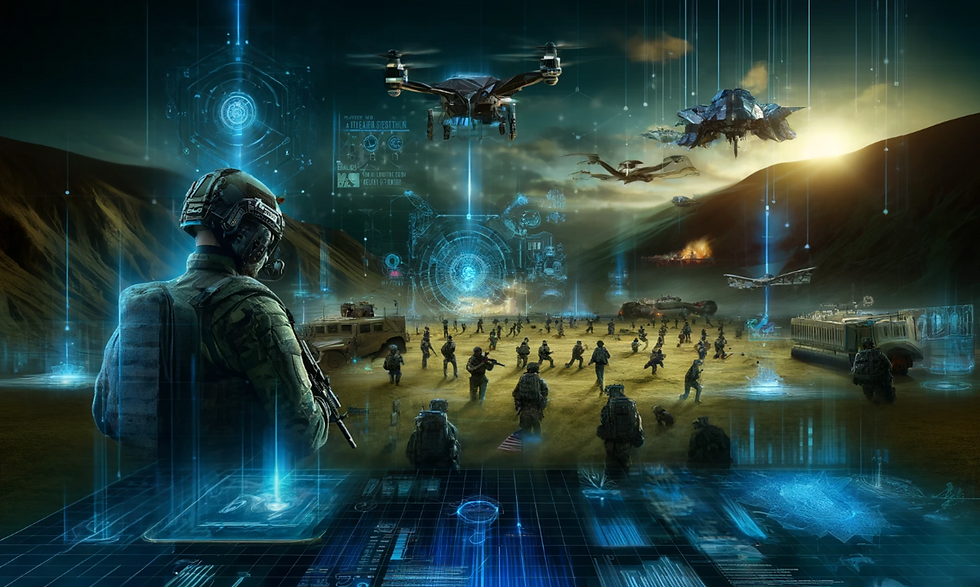AI in Cyber Warfare: How Nations Are Automating Digital Battlefields
- Shilpi Mondal

- Nov 11, 2025
- 3 min read
SHILPI MONDAL| DATE: APRIL 25,2025

The Role of AI in State-Sponsored Cyber Conflicts:
Artificial Intelligence (AI) is revolutionizing the landscape of cyber warfare, enabling nations to automate and enhance their digital offensive and defensive capabilities. State-sponsored cyber conflicts have become more sophisticated, with AI playing a pivotal role in executing and defending against cyberattacks.
AI-Powered Cyber Offensives:

State actors are increasingly leveraging AI to conduct cyberattacks that are faster, more adaptive, and harder to detect. AI algorithms can automate the identification of vulnerabilities in target systems, enabling rapid exploitation. For instance, AI-driven tools can scan vast networks to find weaknesses, facilitating large-scale attacks with minimal human intervention.
Moreover, AI enhances the effectiveness of phishing campaigns through the generation of highly personalized and convincing messages, increasing the likelihood of successful breaches. Deepfake technology, powered by AI, is also being used to impersonate individuals and manipulate public opinion, further complicating the cyber threat landscape.
Defensive Applications of AI:

On the defensive side, AI is instrumental in bolstering cybersecurity measures. Cybersecurity firms are increasingly utilizing artificial intelligence to monitor digital environments in real-time, identifying unusual patterns and anomalies that may signal potential threats. This proactive approach allows for quicker mitigation of threats and reduces the potential impact of cyberattacks.
Managed service providers (MSPs) are integrating AI into their cybersecurity offerings, providing small businesses with advanced protection against cyber threats. These services include malware protection, ransomware assessment, penetration testing, and vulnerability assessments, all enhanced by AI's ability to process and analyze large datasets efficiently.
Implications for Small Businesses:
Small businesses are particularly vulnerable to cyber threats due to limited resources and expertise. AI-powered cybersecurity solutions provide small businesses with cost-effective and robust protection against cyber threats. Cybersecurity training programs, often provided by MSPs, educate employees on best practices, reducing the risk of human error leading to security breaches.
Furthermore, AI-powered tools assist in achieving cybersecurity compliance, ensuring that small businesses meet regulatory requirements and protect customer data. Services such as secure email, network security detection, and cloud security solutions are now more accessible, helping small businesses safeguard their digital assets.
The Global Cybersecurity Landscape:

As nations increasingly integrate artificial intelligence into their cyber warfare strategies, the global cybersecurity landscape is becoming more intricate and challenging to navigate. Cyber risk consulting firms are essential in helping organizations navigate this environment, offering services like cyber exposure management and third-party risk management.
The integration of AI into cyber operations necessitates ongoing cybersecurity awareness training for employees and the implementation of robust risk management frameworks. By staying informed and adopting AI-enhanced cybersecurity measures, organizations can better protect themselves against the evolving threats posed by state -sponsored cyber conflicts.
Conclusion:
AI's role in state-sponsored cyber conflicts underscores the need for advanced cybersecurity strategies. Organizations, especially small businesses, must leverage AI-driven solutions and services provided by cybersecurity companies and MSPs to defend against sophisticated cyber threats. Continuous training, compliance, and risk assessment are critical components in maintaining robust cybersecurity defenses in the age of AI-driven cyber warfare.
Citations:
Ec-Council. (2024, August 30). AI in Cyber Warfare: AI-Powered Attacks and Defense. Cybersecurity Exchange. https://www.eccouncil.org/cybersecurity-exchange/cyber-talks/ai-in-cyber-warfare/
LlM, L. L. (2025, February 25). Artificial intelligence and State-Sponsored Cyber Espionage: The growing threat of AI-Enhanced hacking and global security implications. NYU Journal of Intellectual Property & Entertainment Law. https://jipel.law.nyu.edu/artificial-intelligence-and-state-sponsored-cyber-espionage/
Kirichenko, D. (2025, April 8). How will artificial intelligence impact battlefield operations? Default. https://www.lawfaremedia.org/article/how-will-artificial-intelligence-impact-battlefield-operations
Image Citations:
Benmoussa, M. (2024, April 25). AI on the Battlefield: Revolutionizing Modern Warfare. Blog Economie Numérique. https://blog.economie-numerique.net/2024/04/25/ai-on-the-battlefield-revolutionizing-modern-warfare/
Zone, H. (2025, March 10). 10 AI-Powered Tools for Offensive Security in 2025 (Expert-Approved) . Hackzone Cyber Security Blog. https://hackzone.in/blog/ai-offensive-security-tools-2025/
Cybersecurity: 5 risks from supply chain interdependencies. (2025, March 21). World Economic Forum. https://www.weforum.org/stories/2025/01/5-risk-factors-supply-chain-interdependencies-cybersecurity/




Comments